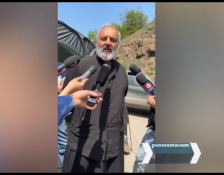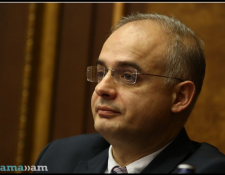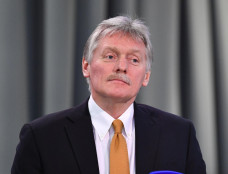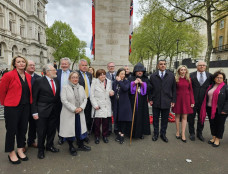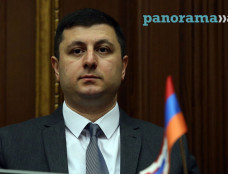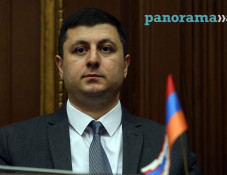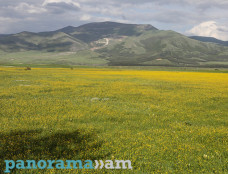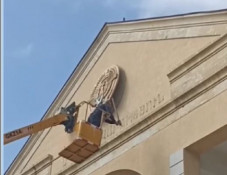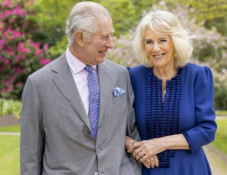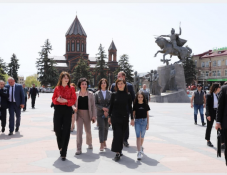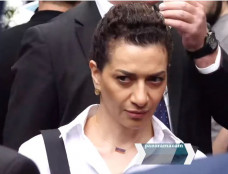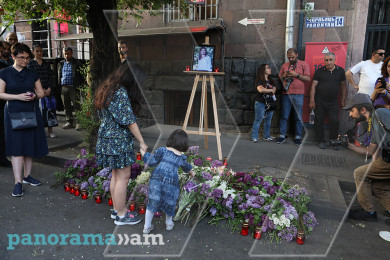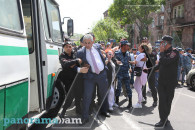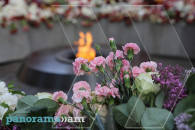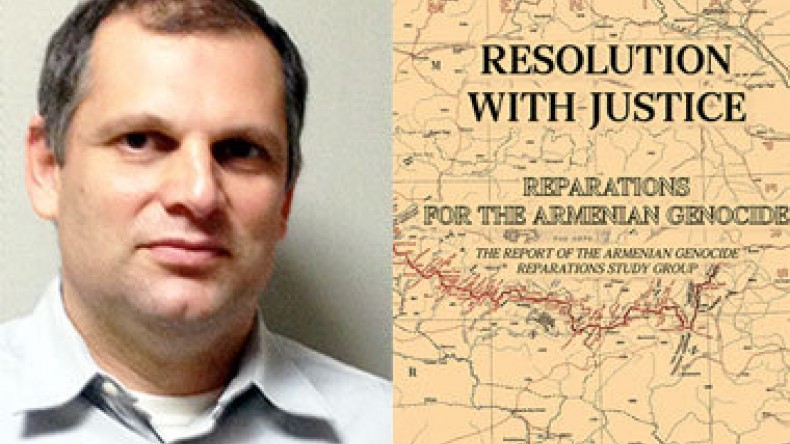
Henry Theriault: Armenia is suffering from legacy of Genocide; Armenia’s long-term security and viability depend on reparations
Nvard Chalikyan from Panorama.am has spoken with Professor Henry C. Theriault – Chair of the Philosophy Department at Worcester State University and Chair of the Armenian Genocide Reparations Study Group (AGRSG) about the recently published report of the Group titled Resolution with Justice: Reparations for the Armenian Genocide (Armenian and English versions of the executive summary and full report are available here).
Part 1
Dr. Theriault says that the issue of Genocide reparations is gaining greater popularity and that recognition should only be a part of broader reparations process and not an end in itself; he believes that the present-day Republic of Armenia is suffering from the legacy of Genocide and that Armenia’s long-term viability as the secure and permanent home of all Armenians depends on territorial reparations; he also explains the group’s formula for calculating the reparations package presented in the report.
Nvard Chalikyan: Dr. Theriault, there seems to be a lack of discussion on the reparations aspect of the Genocide, which the AGRSG Report addresses in detail. How much support does the issue of reparations have in general? How popular is it nowadays?
Henry Theriault: The reparations issue has recently acquired greater importance and acceptance in general. This is true not only for the Armenian case but for many other human rights cases around the world. It is important to put the question of the Armenian Genocide in the context of a wider area called Genocide Studies where many cases are examined together. This is not just an individual group concerned about its own history but it is a much bigger issue in history that concerns everyone else in the world. I link the question of the Armenian Genocide to human rights, social justice, civil rights, and gender issues in the US and across the world. Our report is actually very applicable to other groups, as we tried to present a universal case.
While some ten years ago many Armenians did not consider reparations as a practical issue to be talked about, there has been a major shift in this direction, especially within the last five years. Now there is a tremendous interest in the Armenian community and readiness to advocate for reparations, much more than we had expected when beginning the study group’s work. The Armenian National Committee of America (ANCA), for instance, has changed its strategy a good deal from a focus on recognition towards emphasising reparations; many Armenian scholars have gotten involved, many studies have been conducted and books published on the subject, and in Turkey major work is now being done (by Ugur Ungor and Mehmet Polatel , for instance).
And, the recently adopted pan-Armenian declaration by the State Commission on the Centennial of the Armenian Genocide talks about reparations, specifically “preparing . . . a file of legal claims as a point of departure in the process of restoring individual, communal and pan-Armenian rights and legitimate interests.” So there is a positive trend in this direction.
N.C: Chapter 3 and Chapter 8 of the Report identify steps for a comprehensive reparations package, among which are recognition, apology and return of property. What is the sequence of these steps? Can reparations be considered only after recognition or should we be pushing for reparations without further delay?
H. Theriault: These points of the Report identify different key aspects, but their order is not in time. Recognition is there as part of reparations approach because we think that without recognition by the perpetrator group and others that the harm happened, there is a danger that the point of material reparations will be lost. As one of the report’s co-authors, Jermaine McCalpin, has emphasized in recent speeches, reparations is not “hush money.” On the contrary, it is only meaningful if all concerned acknowledge the injury that was done and understand how and why the reparative measures taken now promote justice. This is especially true for territorial returns.
At the same time, even though recognition and apology should be a part of the overall process, what we want to emphasize is that on their own or as an end result they are absolutely inadequate. It doesn’t help produce justice to push for recognition without pushing for reparation. Thus, we tried to reverse the usual logic – we see reparations as the most central issue which includes both material and symbolic acts, with recognition as part of reparations, but only a part. The idea of giving up a broader reparations process in favor of recognition alone is an old and a very problematic idea.
In terms of the timing, if recognition is understood as a step towards justice and reparations then it can come first, but if it is treated as the central goal then it is very dangerous to put it first.
Still, we should keep in mind that from the Republic of Turkey’s standpoint, one major reason for not recognizing the Armenian Genocide is because they fear that reparation claims will immediately follow recognition, and their primary concern I believe is reparations. We could see this clearly in the case of the Armenian-Turkish protocols. It is very telling that of the very few specific Armenian-Turkish relations issues addressed, the territorial issue, i.e., the point about confirming the border, was on the top of the Turkish agenda. It does tell us a lot about what their concerns are and shows that it is all about territorial issues ultimately. Going forward, we must be very careful to include reparations as an issue in any political discussion of the Genocide with Turkey.
N.C: By recognition do you mean recognition by Turkey, by the international community or both?
H. Theriault: Ultimately both. Many people in Turkish civil society today recognize the Genocide but it is a real question of what would get the Turkish state to do so. Historically for the most part (Australia being an exception) countries have recognized genocides or mass human rights violations only when external actors pushed them to do it. So, there is a role for the international community in pushing for recognition. What is more, the Armenian Genocide is not a Turkish-Armenian issue. Going back to the work of Raphael Lemkin in creating the concept and word “genocide,” genocide affects all of humanity and is thus the concern of all of humanity.
N.C: The Report presents specific calculations of financial, material and territorial compensations that are due to Armenians. Based on what data are these calculations made? How reasonable and realistic are they?
H. Theriault: First of all, in the Report we tried to present numbers based on historical data and on the work that was done previously, in the aftermath of the Genocide, by those with direct data on what happened in the genocidal process. We took data from the Paris Peace Conference for instance, where there was a real historical effort to catalogue the Armenian losses and to calculate a reparation package based on evidence. We also used the New York Life settlement method to get an idea of what appropriate compensation for deaths would be. By “appropriate” here I do not mean that compensation can in any way make up for the deaths, but that compensation funds can help Armenians as a group – in the Republic, Diaspora, and Turkey – with resources that can promote Armenian security, identity, and well-being, against the very significant impacts of the Genocide on Armenians today.
In terms of territorial compensations we tried to come up with a formula based on a realistic approach to Wilsonian boundaries. Woodrow Wilson’s Arbitration Award (Ara Papian addresses this) likewise presents a detailed process which formulated the appropriate territories necessary for Armenians surviving the Genocide to reconstitute in a sustainable way the group. It must be stressed that the need issue is really important because the Republic of Armenia today is suffering from the consequences of the Genocide. We must not forget that the hardships and the limitation of resources in Armenia today are in large part a direct result of Genocide.
Of course, the issue of territorial return is very complex, and in the report we offer four possible approaches to it that include three different territorial determinations and an alternative political approach that could work with any of the territorial determinations.
As for how realistic the size of the proposed financial compensation is, it is a limited, conservative estimate of what would be appropriate. The numbers we are presenting are very reasonable and actually represent a middle point. There are certainly higher estimates that would be legitimate.
N.C: How is the present-day Republic of Armenia suffering from the consequences of the Genocide? How can reparations actually mitigate this?
H. Theriault: This is a huge topic, but I can single out two major issues. First, when Ataturk militarily conquered the bulk of the 1918 Armenian Republic’s lands and forced the remainder into the Soviet Union, that not only stunted the potential population (think about how many Armenians later left just to go to Russia, for instance) but it also created a situation where Armenia just cannot sustain a bigger population, cannot sustain the kind of agriculture that’s necessary for full independence. Thus the impact of that legacy is quite demonstrable today; but it also goes way beyond that. We must not forget that, in fact, the Wilsonian Arbitral Award gave Armenians at least partial reparations for the Genocide, but the Turkish nationalist movement that established the current Turkish Republic took the portion of the awarded lands that the 1918 Republic actually possessed away – that is, Turkey took away the reparations given to Armenians.
The second thing to stress is the way Turkey is currently a threat to Armenia. Just going back to the blockade in 1990s when Turkey was interfering with shipments of food aid from the US – it was scandalous. Turkey is also able to interfere in a significant way with Armenia today and to harm the country economically and politically, while supporting Azerbaijan is a whole other dimension. All of this is the legacy of the Genocide as well, and specifically that the Genocide is unacknowledged and unrepaired. Could Germany, for instance, treat Israel in this way?
So if we are talking about calculating the land that’s necessary, it really has to be focused on what the Armenian Republic needs in order to be permanently viable for its population and any Turkish and Diasporan Armenians that would like to resettle. Territory is not only a historical justice issue but it is also a very legitimate human rights issue for the present. My analysis of the situation has led me to conclude that the future viability of the Armenian Republic as the secure and permanent home of Armenians as an identity group depends on territorial reparations.
N.C: From your words can we conclude that the present territory of the Republic of Armenia is not viable for the long-term survival and prosperity of the Armenian people, and that the Genocide reparation is actually a question of security of Armenia and Armenians in the long run?
H. Theriault: Yes, absolutely…
See part two "Prof. Theriault on Genocide Reparations Report: Azerbaijan’s treatment of Armenians was the result of Genocide not dealt with"
Part 3 Prof. Theriault: It is pointless to engage in dialogue unless Armenians can have equal footing with Turks
Interview by Nvard Chalikyan
Newsfeed
Videos





